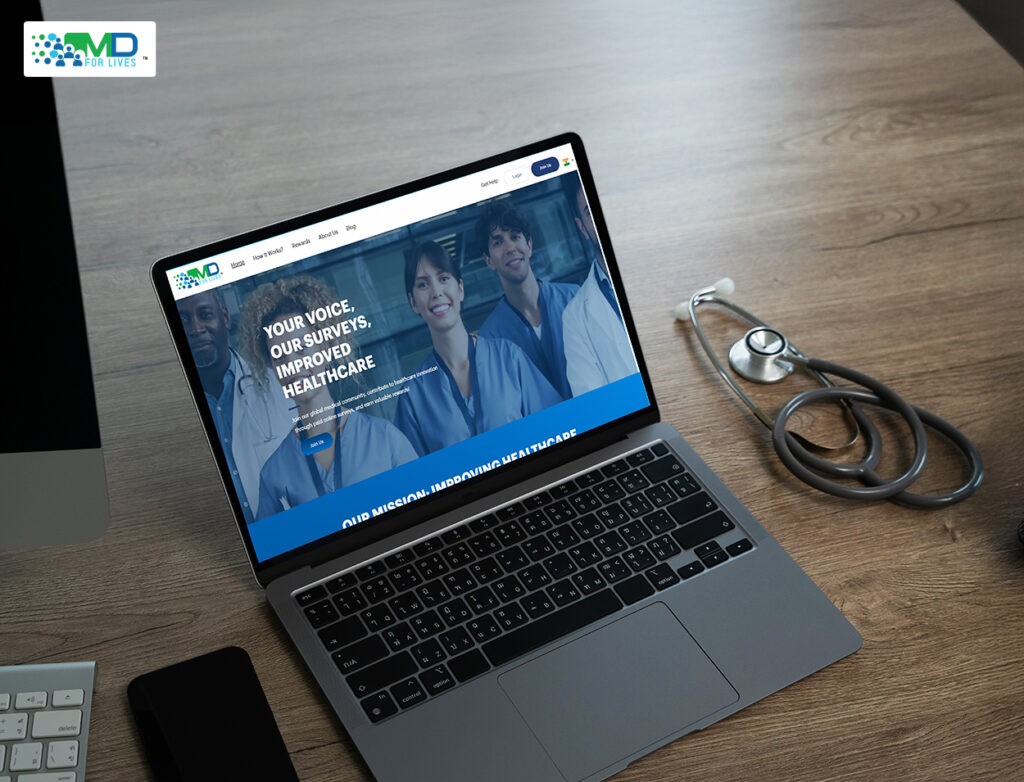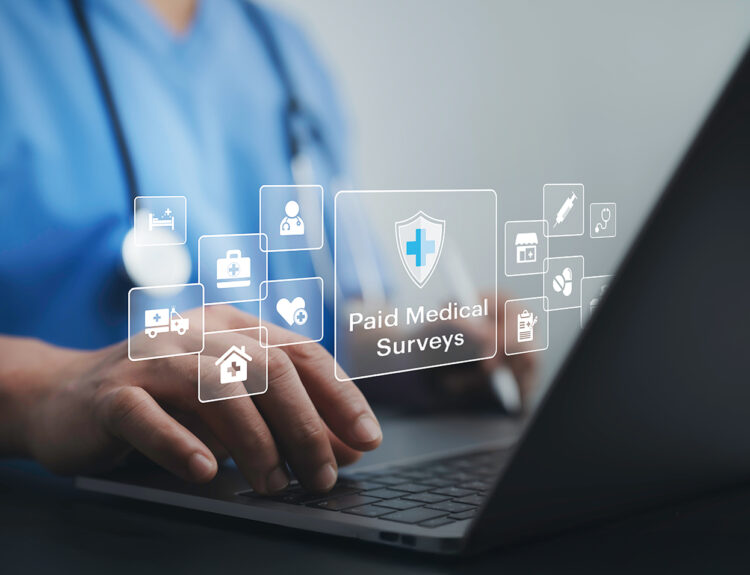Every breakthrough in healthcare – be it a new drug, a diagnostic tool, or a treatment protocol, starts with clinical insights that can’t be found in textbooks. These insights come from doctors who witness real-world challenges every single day. But how does one tap into their insights? Well, it’s simple – through medical market research.
Medical surveys offer a practical way for MDs to share their insights without stepping away from patient care. Whether it’s guiding pharma innovation or refining care delivery models, their voices shape decisions that impact the whole healthcare ecosystem.
With that influence comes opportunity – both professional and financial. This blog explores how MDs can tap into these opportunities and contribute to medical research initiatives, what formats are available, and how to get started with platforms that value their time and expertise.
What is Medical Market Research
Before any new drug hits the shelves or a diagnostic tool reaches clinics, there’s one thing that sets the direction: medical data. Such information goes beyond numbers, as it represents insights from real healthcare heroes. This is where medical research comes into the picture!
Medical research is how healthcare companies gather invaluable insights that involve structured studies, paid medical surveys, and interviews with professionals who understand what works and what doesn’t. From identifying gaps in treatment to exploring how doctors adopt new therapies, medical research bridges the gap between innovation and impact.
On the other hand, for healthcare organizations, this information is the fuel that powers decision-making to improve medical facilities.
Importance of Medical Research Surveys
The invaluable insights that MDs in pharmaceutical research provide not only improve healthcare facilities worldwide but also shape the future of patient care and advance medical breakthroughs.
Here are some of the major reasons why many reputed healthcare organizations and pharmaceutical companies resort to medical market research:
1. New Drug Development
The pharmaceutical R&D costs are on the rise, and the average expenditure to create a new drug has reached $2.6 billion. Having said that, 9 out of 10 new drugs fail to reach the market.
Medical surveys and MDs in pharmaceutical research can help mitigate this risk by providing healthcare institutes with prescribing patterns and treatment preferences before substantial investment.
2. Improved Patient Care
Targeted market research helps understand how ‘patient care’ needs to evolve, based on various factors, such as- age, gender, and medical conditions. Understanding these demographics helps healthcare providers tailor facilities to real patient needs, ensuring both efficiency and positive reception.
3. Increased Medical Device Adoption
Medical devices often face resistance, not from lack of value, but due to overlooked practical concerns. Early research identifies issues like usability, training, cost, and risks, enabling companies to address them proactively, build trust, and accelerate adoption.
Why are MDs Essential in Medical Market Research
In healthcare, it is true that medical devices capture data. But it’s doctors who transform it into actionable insights. Every diagnostic choice, treatment adjustment, and clinical observation adds a layer of awareness that medical devices alone can’t provide.
That’s why, involving MDs in online research is extremely essential! Their experiences shape medical solutions, better tools, and smarter protocols.
Let’s take a look at the different ways in which MDs can help in medical research:
- Deliver patient insights: Based on daily clinical interactions, MDs can help healthcare companies or pharma brands develop an understanding of actual patient needs, behaviors, and treatment preferences.
- Offer clinical expertise: MDs bring firsthand expertise from healthcare settings, offering researchers precise insights that mirror real-world medical practice.
- Identify unmet needs: They excel at evaluating treatment effectiveness and product safety, helping spot gaps in current therapies and offering potential solutions.
- Build credibility and trust: An MD’s involvement in medical market research enhances credibility, enabling companies to confidently apply findings in their decision-making.
- Maintain regulatory compliance: Through market research, MDs can share their expertise in healthcare regulations, identifying compliance requirements early during the research and development process.
In short, MDs connect practical clinical experiences with broader market needs, enhancing the value and applicability of medical market research. This explains why healthcare companies have started looking for healthcare professionals’ input before taking critical decisions to develop products and services that are truly needed and valuable.
5 Benefits of Participating in Medical Market Research
MDs are busy professionals, often working round-the-clock with no free time to spare. So, why should they consider participating in online medical research on top of their demanding workload?
Here are five compelling reasons:
1. Earn Additional Income
Medical research is a great way to set up a side income for doctors, ranging from hundreds to thousands of dollars every month! Whether it’s after work hours, during breaks, or on weekends, they can participate anytime from anywhere!
2. Contribute to Medical Innovations
MDs play a crucial role in shaping drug development, medical devices, and treatment protocols by sharing their firsthand clinical expertise. Their involvement ensures new solutions effectively tackle real-world challenges in daily practice.
3. Advocate for Patients
Through direct patient interactions, doctors gain deep insights into real-life treatment challenges. By sharing these insights through structured paid medical surveys, webinars or discussion forums, MDs help shape therapies and treatments that truly prioritize patient care.
4. Contribute to Advancements While Staying Clinically Informed
Involvement in research allows MDs to discover initial stages of new treatments procedures, technologies, protocols and more. While the primary goal is to share clinical input, this process also keeps them informed about emerging trends and innovations in healthcare.
5. Open Doors to New Opportunities
Participating in medical research expands professional networks and visibility. MDs who regularly share insights through paid medical surveys, often receive invitations to speak at conferences, join advisory boards, or collaborate on specialized projects that extend their influence beyond clinical practice.
How Can MDs Contribute to Medical Market Research
Contributing to research doesn’t have to be a rigorous and time-consuming process. Today, there are multiple ways in which MDs can contribute to medical research, each designed to fit seamlessly into their hectic schedule.
Here are some of the common ways in which MDs can contribute to medical research:
1. Online Medical Surveys for Doctors

One of the simplest ways to earn money on the side is by participating in paid medical surveys.
Medical surveys for doctors can be in the form of multiple-choice questions, rating scales, and open-ended queries. Participating in such research studies would hardly take 5 to 30 minutes (max).
2. One-on-one Interviews
These interviews are in-depth conversations between MDs and research teams. These are used to explore a doctor’s real-world experience with specific treatments, medical devices, or care approaches.
These interview sessions usually last 30 to 60 minutes and offer higher compensation due to the depth of discussion involved.
3. Focus Groups and Panel Discussions
These sessions involve collaborating with fellow MDs to evaluate new developments in the field of healthcare.
The exchange of knowledge that takes place between MDs in a focus group/panel discussion session often brings unique perspectives to the table. These discussions typically last one to two hours and offer premium compensation.
4. Clinical Advisory Boards
These are long-term partnerships where doctors become a key part of advisory boards in relevant healthcare organizations to shape policies and treatment guidelines.
Clinical advisory boards typically involve quarterly meetings and establish doctors as ‘thought leaders’ in the industry, alongside offering competitive compensation.
How Much Can MDs Earn by Contributing to Medical Market Research

Please Note: There are no hard and fast rules – MDs can participate in any form of paid medical research for doctors depending on their experience, expertise, and research requirements. Plus, compensation is based on the specific project. Refer to the specific survey for details on the kind of compensation doctors will receive.
Selecting the Right Paid Medical Market Research Platform
Many platforms claim to offer paid surveys for doctors, but only a few are designed with research integrity in mind. Some prioritize promotional agendas over clinical relevance, while others lack clear data policies or credible research backing.
For doctors aiming to contribute meaningfully, the ideal platform should demonstrate transparency, medical legitimacy, and respect for clinical expertise, instead of just offering honorariums.
Here’s what to look for when picking the right healthcare market research platform:
- Check its industry reputation and reviews.
- Pick a platform that provides fair compensation to all the MDs participating.
- Ensure that the research conducted actually focuses on developments in healthcare rather than being focused on product promotions.
- Carefully review the terms and conditions. They should include provisions that protect both personal information and any clinical insights shared.
- Find companies that verify MDs’ profiles before participation, as it highlights their authenticity and expertise.
After shortlisting a platform, look at their ethical guidelines to maintain compliance, which covers:
- Regulatory certifications: Look for adherence to regulations like GDPR and CCPA, which reflect strong data protection practices.
- Study transparency: The platform should clearly state the research objective and how MDs’ inputs will be utilized to support healthcare decision-making.
- Patient privacy compliance: Ensure strict protocols are in place to protect patient identity and prevent the sharing of any clinical details.
- Compensation policies: Review payment terms carefully, including the amount, timeline, and method to ensure fair recognition of time and expertise.
How to Start Earning through Medical Market Research
Participating in online research doesn’t require a complicated process or hours of paperwork. After zeroing down on a particular paid medical survey platform, the process is pretty quick and easy!
Let’s take a look:
1. Create an Account
Most research platforms have a simple registration process that takes just a few minutes to complete. Typically, MDs need to share their name, age, contact details, specialty and medical credentials (license number).
2. Complete the Profile
Once the account is set up, MDs need to complete their profile. This step is extremely crucial as it will help you match with relevant paid medical surveys.
3. Accept Invites
After completing your profile, the survey platform will verify your credentials and start sending invitations via email. You can also check your dashboard regularly for new opportunities, as high-demand surveys fill up quickly.
MDForLives: One of the Most Trusted Medical Survey Platform
Finding credible, well-paying research opportunities shouldn’t feel like a side job in itself! MDForLives simplifies the process by connecting medical professionals with verified, relevant studies across Pharma, MedTech, and Public Health.

With a global network of over 1.2 million healthcare professionals, MDForLives is trusted for several reasons:
- Access a variety of paid opportunities including medical surveys, discussion forums, webinars, and referral programs.
- Get matched with research projects that align with your specialty.
- Earn handsomely for contributing your time and sharing informative insights.
- Participate anytime from anywhere!
If you want to skip the process of looking out for a legitimate survey platform, look no further and register with MDForLives!
Get Paid to Share Your Expertise & Shape the Future of Healthcare
As an MD, you make a difference every day. But your influence doesn’t have to stop at the bedside. Your firsthand experience holds the power to shape the future of medicine by guiding the development of life-saving treatments, groundbreaking medical devices, and better healthcare policies.
By participating in paid medical research, you ensure that real-world patient needs and clinical challenges are heard. Every survey you complete brings us one step closer to smarter solutions, improved patient care, and a stronger healthcare system. And while you’re making an impact, you’re also earning for your valuable time and insights.
Your voice matters. Your expertise is needed.
FAQs
-
What is the Best Side Business for Doctors?
Start a YouTube channel to share medical tips and healthcare practices. Once doctors reach a certain milestone, the platform will start paying them. Plus, try telemedicine, which allows doctors to see more patients remotely or bring services directly to a patient’s home, creating convenience that attracts more people.
-
How Can I Make More Money as a Doctor?
Paid medical research for doctors is one of the easiest ways to earn money, where they are incentivized to share their opinion with healthcare companies and clinical researchers. Medical writing offers another great option, letting them earn additional income by creating content for journals, websites, and educational materials.
-
What is the Highest-Paying Side Job for Doctors?
One of the best ways to earn side income for doctors is by offering medical expertise in courtroom cases, serving as expert witnesses for prosecution or defense teams. Plus, becoming an independent medical reviewer and evaluating cases for insurance companies offers excellent pay.
-
Why is Medical Research Done?
Medical research is essential to drive advancement in healthcare, from patient care to treatment plans and medical technologies. It helps companies identify critical gaps in hospital systems and understand the needs of both practitioners and patients.
By bringing to the forefront the challenges doctors face, medical research paves the way for better research and more effective clinical solutions.

MDForLives is a global healthcare intelligence platform where real-world perspectives are transformed into validated insights. We bring together diverse healthcare experiences to discover, share, and shape the future of healthcare through data-backed understanding.






